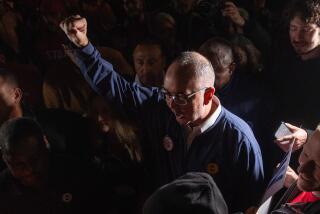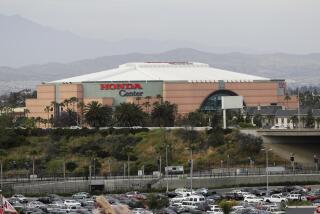Chrysler Profit Sets Record for Quarter : But Iacocca Warns That New Labor Pact May Cause Firm to Buy More Overseas
- Share via
DETROIT — Chrysler Chairman Lee A. Iacocca warned Monday that the company’s expensive new labor agreement with the United Auto Workers will add to mounting pressure on the auto maker to buy more components and fully built cars overseas--unless the union agrees to streamline its plant-level work rules in return for the contract’s higher wages.
At a press conference held to announce that Chrysler’s third-quarter earnings rose 20.9% to a record $316.2 million, Iacocca said he was “disappointed” that the company didn’t win a stronger commitment on its top bargaining demand--that the union agree to reduce the number of job classifications in Chrysler’s plants in order to increase the flexibility of the company’s work force.
Chrysler had asked for a companywide program to streamline job categories in return for granting big wage gains in last week’s $1-billion contract settlement. Instead, the UAW only agreed to pilot programs at four plants to test more flexible work systems.
But Iacocca indicated that he still hopes the union will eventually cooperate with the company to spread the streamlined system to other plants over the next few years.
Labor Costs Equal
Iacocca placed such heavy emphasis on the contract’s provisions for plant-level productivity improvements, which must be ironed out on an ongoing basis with the union over the life of the agreement, because he said they are crucial to Chrysler’s ability to remain a competitive domestic auto producer now that its labor costs are equal to those of its larger domestic rivals, General Motors and Ford.
“It’s the old story; if you pay out more, you get less competitive,” Iacocca said. “The present workers got their fair share under this contract, but what it holds for future employment is going to depend on just how competitive we get plant by plant.”
Chrysler says that, companywide, its workers now fall under as many as 500 different, strictly defined job categories, compared to as few as five or six categories at the Japanese auto companies. The proliferation of restrictive categories limits the range of tasks that individual workers are allowed to perform and thus reduces productivity, company officials argue.
Chrysler’s new three-year pact was ratified by its 70,000 U.S. workers on Sunday, ending a 12-day nationwide strike that Iacocca said cost Chrysler between $150 million and $200 million in lost fourth-quarter profits. The agreement will increase the auto maker’s labor costs by 6.5% per year--which is well above the rate of inflation--or more than $1 billion over three years, company officials said.
Rewards for Workers
But Chrysler satisfied the UAW’s key demand for wage “parity” with GM and Ford, and it also provided cash bonuses to partially reimburse workers for concessions they granted Chrysler between 1979 and 1981 to keep the company afloat.
Iacocca acknowledged that, “with the company making so much money over the last 24 months, it was pretty hard to argue that our (workers) shouldn’t get as much as the people at Ford and GM. The workers had to be paid back something for the sacrifices that they made.”
Still, he complained that the contract, which includes provisions for a $170-million job security “bank” to protect workers from being laid off due to the subcontracting of work to domestic or foreign suppliers, doesn’t provide real job security because it doesn’t make Chrysler’s plants more competitive.
Iacocca said the company has no immediate plans to increase its use of foreign parts as a result of the higher labor costs of the new contract. He noted that Chrysler has already expanded its purchases of imported cars and components as a result of the easing of import quotas on Japanese cars and so doesn’t need to make additional foreign sourcing moves right away. But he warned that the trends are increasingly ominous for Chrysler’s domestic auto production.
“When you add it all up, we are still a 90% local content company,” Iacocca said. “But are we going to be that five years from now? Oh, I don’t know that number. I’m not positive of that number, but the pressure is on to take it down.”
For the third quarter (which ended before its U.S. and Canadian strikes began), Chrysler’s net income of $316.2 million even outpaced Ford’s earnings of $313.1 million.
Chrysler said sales incentives helped spur its U.S. car and truck sales to a 24.3% gain during the quarter, offsetting the heavy costs of the incentive program.
Chrysler had worldwide sales of $4.5 billion and pretax earnings of $451.8 million--both records for the third quarter.
For the first nine months of 1985, Chrysler’s net earnings were off 19.8% to $1.42 billion, primarily because the company has exhausted the tax benefits that it built up from its massive losses in the early 1980s, making its earnings once again subject to income taxes.






